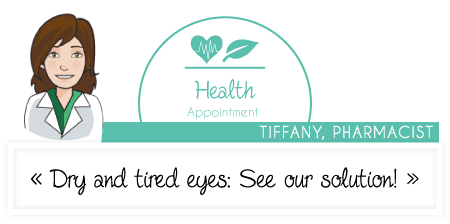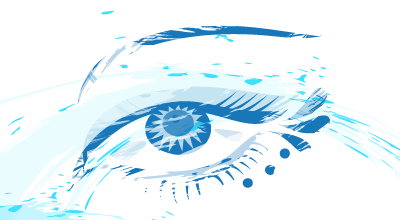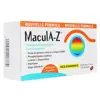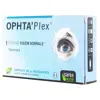

Whether it’s pollution, dust, UV, pollen or staring at a computer screen, our eyes are under constant stress and are always adapting to their environment. Therefore, it comes as no surprise that signs of dry and tired eyes can often appear. Understand the difference between them both and see our advice and tips to maintain good eye health.
Eye discomfort and tiredness

Eye tiredness is the result of a brief change to the functioning of the eye, due to excessive use. This includes eyestrain and visual fatigue. Visual fatigue comes in several forms: a feeling of discomfort, tingling, or burning, often with watering eyes and irritant eyelids. Most of the time, visual fatigue appears towards the end of the day, following a lack of sleep, repetitive strain on a computer screen, or even during long journeys. These symptoms are a direct consequence of not having enough lacrimal secretion. Generally, we blink 12 to 20 times a minute, which mean your eyes are continually reproducing a lacrimal layer to protect the surface of the eye. When working in front of a screen for example, you naturally blink less, which leads to eye dryness and reduces the eye protective layer. Fortunately, there are solutions to reduce these symptoms. If your eyelids feel quite irritant, you can clean them by using sterile Blephaclean pads , made especially for eyelids and sensitive skin. After that, apply a soothing cream such as Ilast Care to protect your eyelids and help to maintain eye hydration. For eye discomfort, use a specific solution such as the Optone ActiMist 2-in-1 spray to instantly relieve your eyes and stabilise the lacrimal layer.
Our tips:
- • Make sure you have plenty of rest and regularly get a good nights sleep.
- • If you work mostly on a computer, consider distancing yourself from the screen a little and take regular breaks.
- • Tilt the screen you’re working on slightly to reduce the reflection on your eye.
- • When driving, take regular breaks every 2 hours.
Eye dryness

Eye dryess or dry eye syndrome can arise when there is not enough water produced in the tear glands, or following a change to the eye lacrimal layer which leads to excessive evaporation in the eye. Symptoms of eye dryness can vary and cause several uncomfortable feelings:
- • The feeling of sand in your eye
- • Tingling
- • Excessive blinking
- • Bloodshot eyes
- •Difficulty wearing contact lenses
- •Vision trouble...
Eye dryness can stem from different causes:
- • Natural ageing: with age, the tear glands start to produce less and less. The onset of eye dryness is particularly common among women entering the menopause.
- • Wearing contact lenses
- • Environmental factors such as pollution, exposure to tobacco smoke, air conditioning, heat etc.
- •Taking certain tablets such as the contraceptive pill, antihistamines, anti-parkinson tablets etc.
- • Eye surgery
- • Smoking
- • Other factors
To relieve eye dryness, you need to rehydrate the eye. For this, there are many eyecare treatments such as eyewashes and lubricant gels. Gels can blur vision for a short while, therefore, we advise you use them in the evening before going to bed. However, artificial drops can be used as often as you wish.
Nutritional Supplements for the Eyes

The eye is a sensitive and fragile organ, which requires a little care. Many properties like antioxidants, vitamins and trace elements are essential to nourish and protect the eye tissues. We recommend taking supplements regularly to prevent the onset of eye tiredness or when symptoms appear to give your eyes the essential active ingredients they need. These supplements are also advised in cases of Age-related Macular Degeneration (AMD). Out of all the many products available on the market, we advise you to opt for the supplements that contain:
- • Pigments for the retina: lutein and zeaxanthin. These are active ingredients which filter blue light and protect the centre of the retina from oxidation by free radicals.
- • Vitamin A, C and E. Vitamin A helps to maintain normal vision and vitamin C and E both help to protect cells against oxidative stress.
- • Zinc. It helps to stabilise the metabolism of vitamin A and normal vision.
- • Omega 3, particularly with a high ADH content. This is one of the major components of the retina’s photoreceptors.


